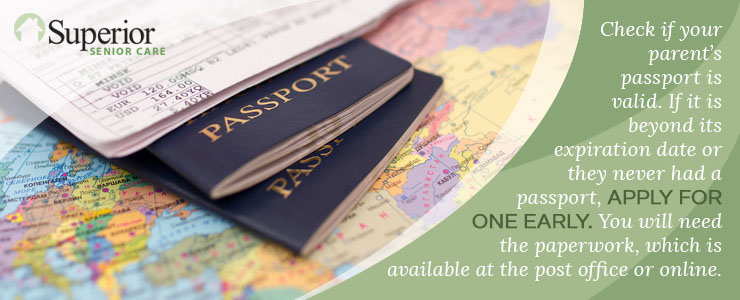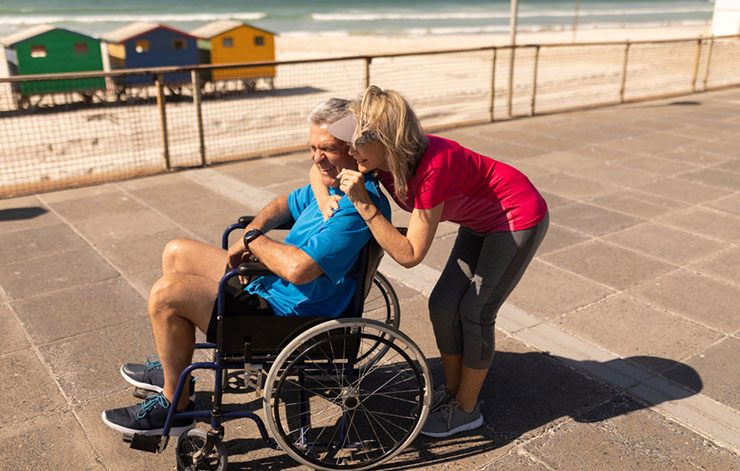
You were talking to your Mom or Dad, and they mention that they wish they had traveled more in their younger years. Maybe they mention a location they were always wishing they could see. Or their 50th class reunion from high school is coming up, and they mention that they wish they could go back to their hometown for the celebration. Whatever it is, you are thinking to yourself that you want to make it happen. There are going to be difficulties, but you are determined. So, where do you even start?
First, be realistic about your parent’s ability, both physically and mentally. Can they safely travel alone, or do they need a companion? If they will need help on their trip, will you provide the best senior care for them? If your parent already has professional senior caregivers assisting at home, Mom or Dad probably has had an assessment by them to determine their current ability, as well as needs for assistance.
Consult with them to get input on what it would take to ensure a successful trip for your parent and whether you can make this possible. If you decide to move forward with this trip, here are ten areas that need to be addressed.
1. Destination. Decide what the destination will be. Talk to your senior parent and find out where they want to go. Maybe there is a trip on their bucket list that they still want to accomplish. Maybe they want to have an extended visit with an out-of-state son or daughter, or they want to see a beloved sister or brother. Once you know where they want to go, you can start taking steps to make their trip a reality.
If they want to visit a friend or family member, check with the person they want to see and determine if the visit is possible. Maybe they would love to see your parent but would be unable to invite them to stay in their home. This is very likely if your parent is in a wheelchair or has other disabilities. The decision is then whether they still want to go but stay in a hotel.
This is also the time to decide if your parent is going on the trip alone or are you also going? Be realistic about your parent’s capabilities. Are they experienced travelers or will this be their first flight? If your parent becomes anxious or confused easily, they may not be safe traveling alone.

2. Passport. If the trip you have decided to take is outside the U.S., check if your parent’s passport is valid. If it is beyond its expiration date or they never had a passport, apply for one early. You will need the paperwork, which is available at the post office or online. Along with the fee, you will also need an official passport picture. Some drug stores and other retail businesses are able to take the pictures. A personal photo is not acceptable.
3. Mode of Travel. Once you’ve decided on the destination, investigate the different travel options. If your parents will be flying, try to find a direct flight to their destination. If there must be a connecting flight, schedule the connecting flight with enough time for your parent to make the connection easily. Besides flying, consider a bus or train, or even a road trip in an RV or auto.
Maybe even a water route is possible. There are passenger boats that travel the Mississippi River, docking at various cities. There are river cruises available in Europe, including the Danube.
Of course, there are the cruise ships that travel to Alaska and the Caribbean, as well as cruise ships that travel the Mediterranean Sea with stops in different port cities. The advantage of the ship is that your senior will have a home base on the ship while traveling to different cities—no changing hotels every couple of days.

4. Senior Tour Groups. If your parent is going to travel alone, look into tour groups that are designed for seniors. These trips have a more leisurely pace with time for rest if needed. The hotels are chosen for their accessibility. Staff is competent in assisting seniors as needed.
5. Travel Agents. A good travel agent can be worth their weight in gold. They can make sure the hotel you stay at has rooms on the ground floor or elevators. They can find hotels that are wheelchair-accessible. They can also determine if the site you want to visit is wheelchair-accessible.
Some European countries won’t rent a car to people over a certain age or they will charge extra based on age. Your travel agent can sort all that out for you and find the best alternatives. Talk to your agent about what you want included on your “must see” list, and then a second “like to see” list if there is time. Be very honest about any physical limitations your senior has, including a need for rest time, an inability to climb stairs, or not being capable of walking hilly terrain.
6. Get a Doctor and Dentist Checkup. It would be horrible to have your senior wake up the first day of your vacation with a serious toothache. Take them to the dentist a couple of months before your vacation to have a checkup. If there is anything that needs attention, you have time before you leave to have it taken care of.
Same for the doctor. Hopefully, your senior has been seeing the doctor annually for checkups and this visit will be just to make sure everything is stable. While there, inform the doctor of where you are planning to go and what concerns you have. Make sure your senior is up to date on immunizations, including the flu vaccine. Check if the prescriptions will be continued as they have been. Talk to the doctor about a prescription for motion sickness if your trip includes being on a cruise.

Also, it is a good idea to have medication for traveler’s diarrhea. Talk to the doctor about how to adjust medication schedules to accommodate time zone changes. You may also need documentation from the doctor for special services and needs due to physical impairment. This may be important at the airport if you are flying to your destination. Your travel agent or the airline you are flying on can tell you what you will need from the doctor.
7. Insurance. If traveling out of the country, your parent’s Medicare may not cover emergency health care. Check with Medicare and consider purchasing traveler’s insurance and health insurance for the time your parent is on the trip.
8. Carry-On Bag. Whether you are flying or not, it is a good idea to make up a bag with all the things that are essential—like medications. Keep medications in the prescription bottles that are clearly labeled. Have all emergency information there also. If your parents are traveling alone, make sure they have a cell phone with your number programmed into it so they can call you regularly and for emergencies. They should bring a backup pair of glasses and, if they wear hearing aids, extra batteries.
9. Assistive Devices. Your parent can bring his or her own wheelchair on a plane; however, they do need to notify the airlines. This is especially true if they use an electric-powered wheelchair. The battery may have to be removed during the flight. Make sure all removable parts are labeled with your parent’s name, phone number. and destination.

If your parent is going to use the airport’s or airline’s equipment, they must notify the airline and reserve the wheelchair. Your senior will be assisted into the wheelchair and taken to the gate for boarding. The gate agent then will take your parent to their seat in the plane. They can be met and assisted to their connecting flight and also receive assistance when they reach their destination, if they have notified the airline of the need beforehand.
Some seniors need to use oxygen at all times, and this, too, is allowed on flights—but, again, it must be known to the airline when you book the flight. Airlines are not allowed to refuse you a ticket because of a disability unless it will endanger the other passengers. At the same time, they are not responsible for your senior’s medical care or to give personal care while on the flight.
Be realistic about your parent’s ability. If they will need assistance to use the bathroom or to take medications, they will need to have caregiver accompaniment. If your seniors don’t need any physical assistance but just want someone to accompany them and make sure they get to the airport on time, a senior sitter may be the answer. A senior sitter does not provide any physical care, but they do provide companionship, and they can transport your senior to the airport and stay with them until they are ready to enter the security check area to board.
10. Clothing. Have your senior dress in comfortable loose-fitting clothes for the trip. Strongly consider having them wear compression stockings if they will be sitting for an extended time. This will help to prevent DVTs, which are blood clots in the legs. Seniors are much more at risk of this, and it can be very serious.

If you are driving, stop every two hours, at least, and get up and walk for about 15 minutes. Pack as light as possible. Try to pack outfits that are interchangeable to save space. Be sure that their luggage has wheels. You don’t want your senior to have to haul large, heavy luggage throughout the trip.
These tips give you a starting point. There may be other concerns, depending on your parent’s health issues. If your parent has some dementia, and you are worried that a trip might cause severe anxiety, try a mini vacation closer to home so that you can return them to the security of their home and normal routines if needed.
If the mini vacation is successful, then you can be pretty confident that a longer trip will be also. It also gives you a chance to see what you may need to add to the trip and what should be excluded. This trip may take more planning because of traveling with a senior, but it may end up being a great vacation for you as well as your senior. This may be a great shared experience that will increase the bond between you and your parent that will live in your memory forever.

